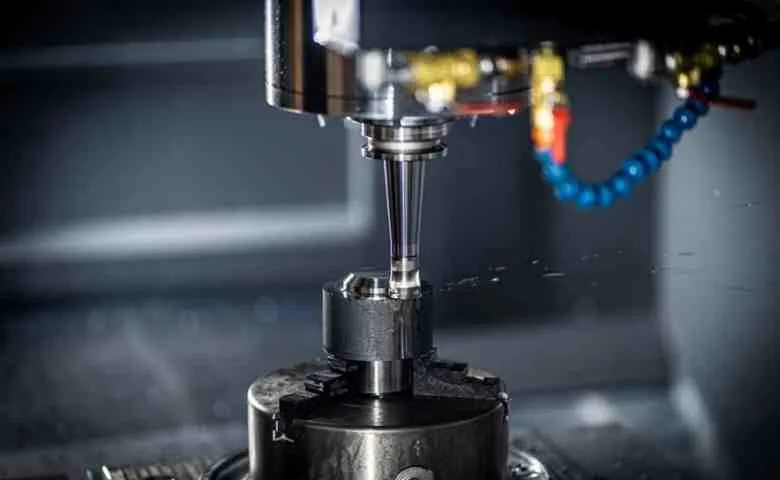Last Updated on May 31, 2023 by Admin
Industrial CNC mills have been making waves in the manufacturing and construction industries for their ability to precisely and quickly produce large quantities of high-quality products.
With the ever-increasing demand for affordable and sustainable housing solutions, it’s no wonder that many experts believe that these cutting-edge machines could play a major role in revolutionizing the way homes are built.
We’ll take a closer look at what makes industrial CNC mills so special and explore how they might impact the future of modular home construction.
Table of Contents
How Does CNC Technology Work?
CNC technology has revolutionized the manufacturing and construction industries by allowing for precise and automated production of complex components.
The use of computer software to control the movement of cutting tools and machinery eliminates the need for manual labor, reducing the risk of human error and increasing the efficiency and accuracy of the production process.
Industrial CNC mills are designed to handle large-scale production runs, making them ideal for use in the construction industry, where large components and structures are required. With their advanced automation capabilities, they can produce complex and intricate designs with exceptional accuracy and speed, delivering high-quality results every time.
In a typical CNC milling process, a computer program is used to generate a toolpath, which the CNC machine then follows to produce the desired component. The software takes into account factors such as the material being used, the size and shape of the component, and the cutting tool specifications to ensure that the final product is produced to the highest standards.
CNC machining technology and industrial CNC mills are poised to play a major role in shaping the future of the construction industry.
With their ability to produce high-quality, precise and intricate components with speed and efficiency, they are an ideal solution for the production of complex components and structures required in modular home construction and other construction projects.
As technology continues to advance and the demand for more affordable and sustainable housing solutions grows, it’s likely that CNC technology will become increasingly popular in the construction industry.
Related Posts:
Advantages of CNC Technology
One of the key benefits of CNC technology is that it allows for the production of highly intricate designs and shapes that would otherwise be difficult or impossible to produce manually. This is particularly useful in the construction industry, where complex components and structures are often required.
With the ability to produce such components with ease and efficiency, CNC mills can help to reduce the amount of time and resources required to produce these items, and can also help to improve the overall quality of the final product.
Industrial CNC mills are also highly flexible and customizable. They can be programmed to produce a wide range of different components, from simple shapes to highly complex designs, and can be easily adapted to suit specific project requirements.
The use of industrial CNC mills in modular home construction can provide greater design flexibility. CNC mills can be programmed to produce a wide range of different components, from simple shapes to complex designs, and can be easily adapted to suit specific project requirements.
This allows architects and designers to have more freedom to explore different design options and create unique, custom homes that meet the specific needs and preferences of their clients.
Another advantage of CNC mills in modular home construction is that they can reduce the need for manual labor. By automating the production process, CNC mills eliminate the need for manual cutting, drilling, and other processes, reducing the risk of human error and improving the overall efficiency of the production process.
This not only results in higher quality components, but it can also help to create safer working conditions for factory workers.
In terms of cost, the use of industrial CNC mills in modular home construction can also have a significant impact.
By reducing the amount of waste generated during the production process and streamlining the overall construction process, CNC mills can help to lower the overall costs of modular home construction. This, in turn, can make modular homes a more affordable option for those looking to build their own homes, and can help to make sustainable and affordable housing a more accessible option for more people.
The use of industrial CNC mills in modular home construction offers a range of benefits, from reducing waste and streamlining the production process to improving the quality and consistency of the final product, and providing greater design flexibility.
Limitations of CNC Technology
While CNC machining has many benefits in the modular home construction industry, there are also some limitations to consider.
One limitation is the initial investment cost, as CNC machines can be expensive to purchase and set up, requiring a significant initial investment.
CNC machining requires a high level of technical skill and knowledge, including the ability to write and program complex codes to control the machines, which may be a challenge for operators who are not trained in CNC programming.
Another limitation is the limited material selection, as CNC machines are designed to work with specific materials and may not be suitable for other types of materials commonly used in construction.
CNC machines require regular maintenance and upkeep, which can add to the ongoing costs associated with CNC machining.
These limitations should be carefully considered when deciding whether or not to incorporate CNC machining into the modular home construction process.
Conclusion
The use of industrial CNC mills in modular home construction is a trend that is quickly gaining momentum.
With their ability to produce high-quality, precise components with minimal waste, CNC mills can help to streamline the production process, reduce costs, and improve the overall quality and consistency of modular homes.
The flexibility and automation offered by CNC mills provides greater design options and improved working conditions for factory workers.
With technology advancing and the demand for sustainable and affordable housing solutions increasing, it is clear that industrial CNC mills have the potential to play an increasingly important role in the modular home construction industry in the future.
FAQs
Yes, there is a future in CNC machining. As manufacturing processes and technologies continue to advance, the demand for highly precise and efficient CNC machining is likely to increase.
Three disadvantages of a CNC machine include:
1. Initial cost and setup time: CNC machines are expensive and can require significant upfront investment, including costs for installation, programming, and training.
2. Limited versatility: CNC machines are designed for specific types of manufacturing processes and may not be suitable for other types of operations.
3. Maintenance and repairs: CNC machines can be complex and require regular maintenance and repairs, which can be costly and time-consuming.
The outlook for the CNC machining industry is positive. The increasing demand for highly precise and efficient manufacturing processes is expected to drive growth in the CNC machining sector in the coming years. Additionally, the use of advanced materials and emerging technologies in the aerospace, medical, and automotive industries is expected to create new opportunities for CNC machining companies.
Industrial CNC mills are computer-controlled milling machines that are used to produce precision parts and components. They are widely used in the manufacturing of a variety of products, including aerospace components, medical devices, and automotive parts. In the context of modular home construction, industrial CNC mills can be used to produce prefabricated components and modules for homes.
There are several advantages to using industrial CNC mills in modular home construction, including:
1. Increased precision: CNC mills allow for high levels of precision in the manufacturing of modular components, which can result in a higher-quality end product.
2. Reduced waste: CNC mills can reduce waste by producing components that are exactly the right size and shape, reducing the need for manual adjustments and cutting.
3. Speed and efficiency: CNC mills can produce components more quickly and efficiently than manual processes, reducing production time and costs.
4. Consistency: CNC mills can produce components with consistent quality and accuracy, reducing the need for manual inspection and rework.


